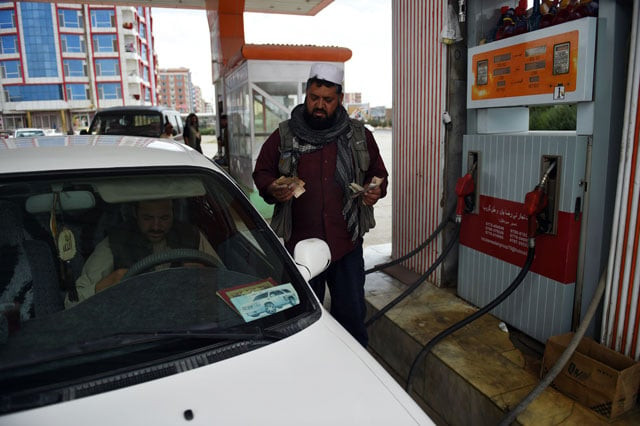Petroleum dealers, banks remain at odds over merchant charges
Petroleum product prices have increased resulting in lower sales volumes and higher business costs

A number of fuelling stations in the country are not accepting credit, debit, or privilege cards as petroleum dealers and banks remain at odds over merchant charges, it was reported on Monday.
A source told The Express Tribune that the profit margin of pump owners is lower compared to cash transactions since banks are collecting merchant charges of Rs 1.60 to Rs 1.75 per litre of petrol from petroleum dealers who allow the use of credit and debit cards at their stations.
“When gas prices were lower and pump sales were higher, the relevant oil marketing corporations used to cover half of the merchant charges levied by petrol dealers for transactions made with credit and debit cards, but things have changed now,” said Shoaib Khanji, a petroleum dealer.
Read: Oil firms ask SBP to review merchant rate
He further added that petroleum product prices have increased resulting in lower sales volumes and higher business costs for dealers.
Khanji also said oil marketing companies no longer agree to cover half of the merchant charges.
“Owners of petrol pumps do not take credit, debit, or privilege cards because petroleum dealers are having trouble covering merchant fees with their low rate of profit,” he further added and said the State Bank of Pakistan needs to step in to resolve the issue.
"In this case, the State Bank should step in and establish a process between banks and fuel dealers and standardize the sale of fuel using credit and debit cards to advance digital payments in the country. This will help the economy,” said Khanji.
Chairman of Pakistan Petroleum Dealers Association Abdul Sami Khan told The Express Tribune that they are negotiating with Pakistan State Oil (PSO) authorities to recoup their share of merchant charges.
"Credit and debit cards, which are mostly utilised by customers who live in posh and wealthy areas, accounted for around 15% of all petroleum transactions," said Sami.
However, PSO officials said, “Even though dealers boost the sales volume of the same oil marketing companies by accepting consumer credit and debit cards, it is challenging for them to recoup their share of merchant charges”.
Also read: Rawalpindi merchants say official price list impracticable
The official added that he would also meet with the Governor of State Bank regarding the issue.
“We suggest that petrol stations should be permitted to charge 2% more than necessary on consumers for sales on credit and debit cards,” he furthered.
However, oil marketing company Gas and Oil (GO) has made it clear that they have not sent any directives to their petroleum dealers telling them not to accept payments made using credit or debit cards. In this situation, GO splits certain expenses with its retail outlets in the form of merchant charges.
“Bank merchant charges are calculated as a percentage of fuel prices. We think merchant charges should be decreased to promote the use of credit cards rather than cash given the low margins on high-value fuel products,” said GO’s spokesperson.
He added that the oil companies advisory council has also highlighted the matter, and has urged the State Bank to instruct banks to lower these charges on petroleum products.
“GO has a strategy of continuing to offer credit card services to clients despite hefty charges,” the spokesperson added.
Meanwhile, a National Bank spokesman said, "Banks continually operate their credit and debit cards, and they charge petroleum dealers in accordance with guidelines and clearance from the State Bank."



















COMMENTS
Comments are moderated and generally will be posted if they are on-topic and not abusive.
For more information, please see our Comments FAQ